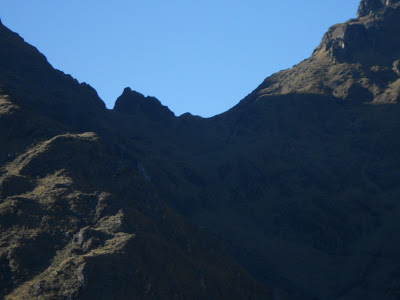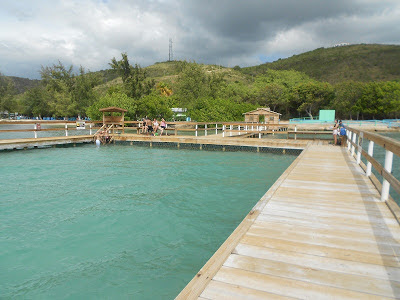Inca Trail Day 2: Dead Woman's Pass
On Day 2, G-Money woke up still not feeling well. When we reached camp for the first night, she
got pretty sick. Day 2, she felt shaky
and still a little nauseous. Definitely
not a good start to our most arduous day of hiking. But what else do you do, but start up the
trail?
Day 2 was the day of Dead Woman’s Pass, a 1200 meter climb
to the highest point on our trek. (The
pass, by the way, is named for the rock formation at the top—though I am sure
more than one trekker would believe it has claimed the life of at least a woman
or two). Right out from the campsite, we
started climbing uphill.
 |
| The pass as seen from the other side. The woman is lying on her back, her face pointing to the right. She has a large forehead, nose, then her chest and belly follow. |
After a solid hour or trekking up the hill, we came to our
first resting point, and waited for everyone in our group to catch up. I was by no means the fastest person in our
group (one of the slowest, as far as uphill trekking goes), but I still had a
nice 10-15 minute wait as the few people behind me—G-Money included—made their
way to us. After others in our group asked
me where my friend was, I explained she was with the guide at the back of the
pack because she wasn’t feeling well.
When G-Money made it to the clearing, the 2 couples from the UK went
over and basically told her there were four of them, all healthy and feeling
good, and they would be distributing her things among them and carrying her
pack—as long as she didn’t mind them re-packing things a bit. She acquiesced to that, and her sleeping mat,
sleeping bag, and pack were divided amongst the four of them. Christine, who had previously been carrying a
very small daypack, actually strapped her bag into G-Money’s larger pack and
conquered the hike.
What amazing people!!
 |
| Carrying 2 packs instead of one. |
After that, G-Money had it a bit easier. It still wasn’t a walk in the park, but she
began calling herself our tortoise and adopted the mindset of “slow, but
steady,” which got her through to the end of the day.
The next two hours were spent climbing uphill…again. I spent these hours getting to know Rose, an
Australian woman who was on the trail with her daughter. Rose was the oldest person in our group, but
you wouldn’t know it by the way she hiked.
She’s friendly and interesting, and I really enjoyed my time hiking with
her.
The next stopping point was the lunch spot. We had about an hour to wait before lunch was
ready, and we spent this time stalking the llamas in the field, playing cards,
or taking naps. Then lunch was served—a
delicious 4 course meal, as per usual—and we were given 20 minutes “for
digestions” before starting off on the last, hardest, leg of the climb to the
top of the pass. We had 500 meters left
to go.
During my last hour and a half of the climb, I was on my
own, as everyone picked their own pace.
For a while, I tailed Alli (Rose’s daughter) like a mirage. Alli would stop on the trail to catch her
breath, and I would see her and think, “I’ll stop when I get to her.” But as soon as I got close, she would start
moving again. I still took a break, and
never did actually catch up for more than 15 seconds, but bridging the gap was
good motivation.
 |
| That's the path on the left...Dead Woman's Pass is in sight. |
 |
| Looking back down the trail |
I found that completing the hike was much like completely
the San Blas Half Marathon (read about that here) in February. I focused my efforts on not stopping, and the
task became feasible. Speed was not the
goal; finishing was.
 |
| The last leg to the top. |
After one hour and 20 minutes, I dragged myself to the top
of the pass. I just had time to catch my
breath, take a few pictures, and marvel in the jaw-dropping view of the way
we’d come, before I ran back to the path to cheer G-Money on as she completed
the final steep steps up to the top.
Once we were all together again, we took a few group
pictures, and then we crossed the path and began walking downhill for the last
2 hours until camp for the night.
You would think walking downhill would be a welcome relief,
after nearly 5 hours of hiking up. And
it was…at first. But very shortly, the
uneven, often large Inca steps took their toll on my knees. If we stopped for even a fraction of a
second, my knees began shaking. On the
way down, G-Money and I walked together—both of us tortoises, bringing up the
rear and making it to camp last.
Going slowly has one great advantage—you get plenty of time
to enjoy the view. And the views that
day were absolutely breathtaking. I
leave you with a piece of what I saw.








Comments
Post a Comment